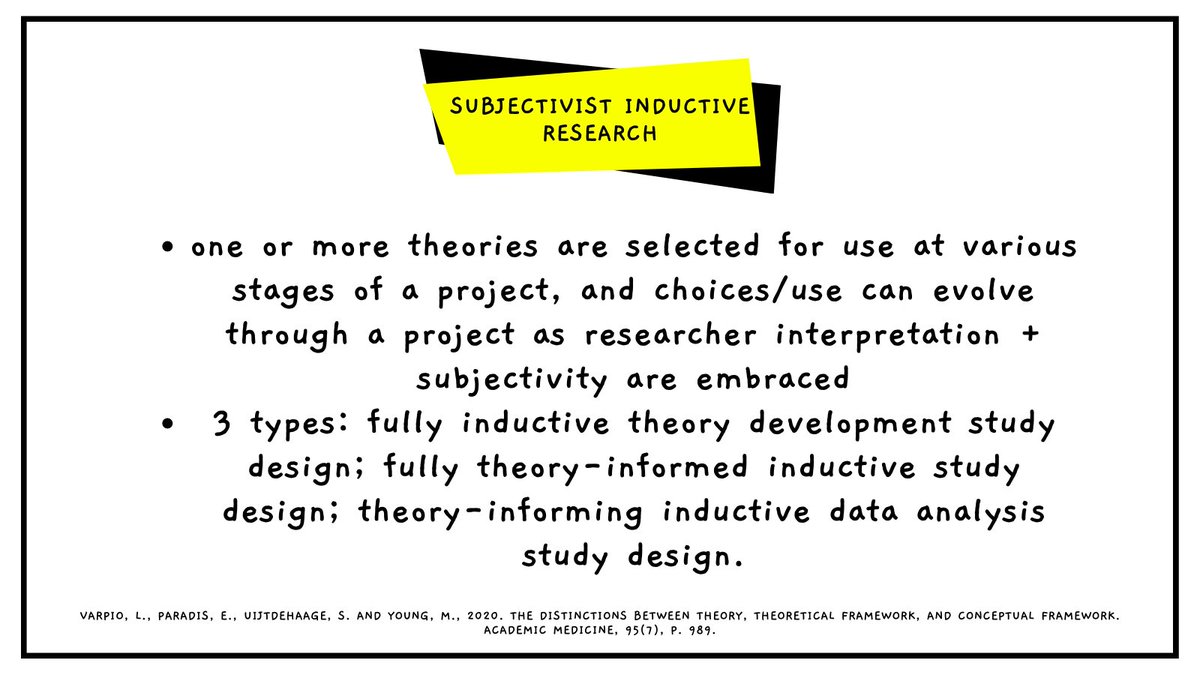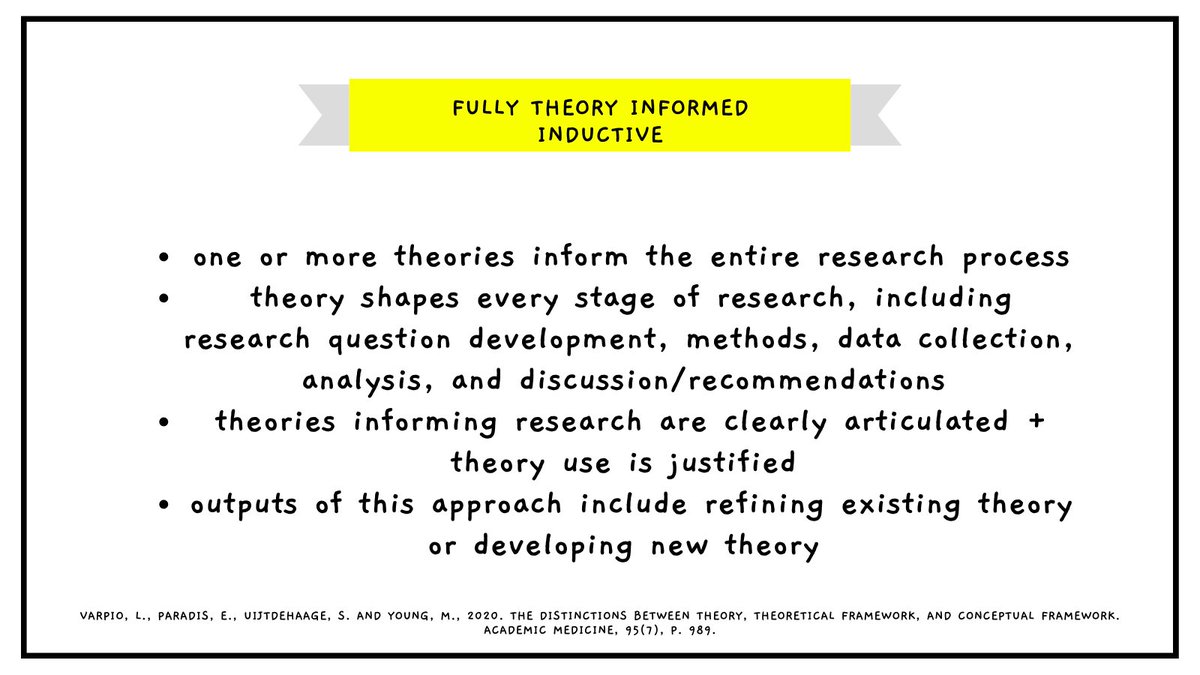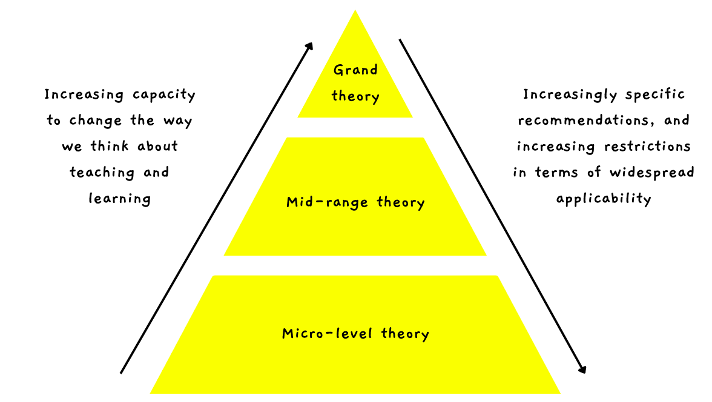
Ok, #MedEd theory nerds – you asked for #TheoryThursday, so here we are.
Before we launch into the weird + wonderful world of various theories, we need to think about what theory is + what it can do.
A thread 🧵
Before we launch into the weird + wonderful world of various theories, we need to think about what theory is + what it can do.
A thread 🧵

What the heck is theory?
Well, theory is so confusing because people don’t really agree on what it is! My fave definition is from @LaraVarpio + colleagues
Well, theory is so confusing because people don’t really agree on what it is! My fave definition is from @LaraVarpio + colleagues

Theories explain the relationships between concepts. Prepositions are statements that might be ✅or ❌ (they are statements made as “facts” that can be true, or may be disproven as false).
So theories have to make statements of “fact “about how concepts connect.
So theories have to make statements of “fact “about how concepts connect.
Ok… but what are concepts??
Concepts are units of thought that bring together the meaning + characteristics associated with events, objects, conditions, situations, people, or behaviour.
We can define concepts through:
- Common experiences
- Research within #MedEd
- Borrowing concepts from other fields
We can define concepts through:
- Common experiences
- Research within #MedEd
- Borrowing concepts from other fields
Let me give you an example of 2 concepts:
1. Transition (e.g., between med school and practice as a new dr)
2. Wellbeing
A theory of how beginning work as a new dr influences wellbeing would have to explain the relationship between (make propositions about) these 2 concepts
1. Transition (e.g., between med school and practice as a new dr)
2. Wellbeing
A theory of how beginning work as a new dr influences wellbeing would have to explain the relationship between (make propositions about) these 2 concepts
And if we’re making statements of “fact” about the relationships between concepts, we need to test these connections.
Theory should propose something that can be tested.
Theory should propose something that can be tested.
I don’t mean that we can test theory in a lab or a randomised trial, but we need to collect (usually qualitative) data to explore + scrutinise theory in various contexts.
Data may consist of:
- Interview audio + transcripts
- Field notes
- Diaries
- Videos
- Images etc.
Data may consist of:
- Interview audio + transcripts
- Field notes
- Diaries
- Videos
- Images etc.
How can we classify theory?
One way is according to “explanatory power”.
Theory can be:
- Grand
- Mid-range
- Micro
One way is according to “explanatory power”.
Theory can be:
- Grand
- Mid-range
- Micro
Grand theories try to explain large social landscapes. They offer a broad framework for organising thoughts on teaching, learning, and research. They are abstract. They are usually used across disciplines. 

Mid-range or middle-range theories try to connect grand theories to more specific aspects of our experience, or our interactions. They are common + popular within #MedEd (often used when suggesting interventions). They are often discipline (Med Ed)-specific. 

Micro theories focus on individual-level experiences/ phenomena. At this level, links between concepts aren't extensively addressed; instead, an individual concept (like wellness) is explored in-depth to advance our understanding of how a concept is experienced or occurs. 

The more grand a theory is, the more abstract claims it can make about teaching and learning that have the potential to radically alter the way we think.
BUT – it is challenging to put abstract claims into practice.
BUT – it is challenging to put abstract claims into practice.
The more micro a theory is, the more it can make specific recommendations for changes in practice.
BUT – very specific recommendations are less widely applicable.
BUT – very specific recommendations are less widely applicable.
So we use grand/mid-range/micro theories for different purposes within #MedEd.
Knowing what each can do can help us decide which might be most appropriate – do we want to make broad claims about learning and the social world, or focus in the experience of a specific concept?
Knowing what each can do can help us decide which might be most appropriate – do we want to make broad claims about learning and the social world, or focus in the experience of a specific concept?
Research can be THEORY DIRECTED – where you start with and apply existing theory to research
Or THEORY GENERATING – where you draw on a range of relevant theories/concepts + combine these with insights from data to create new theoretical explanations/ models of practice
Or THEORY GENERATING – where you draw on a range of relevant theories/concepts + combine these with insights from data to create new theoretical explanations/ models of practice
Within "theory directed" research you can either:
1. Pre select a theoretical position which will drive your research and analysis
2. Select + adhere to the theoretical underpinnings of a particular methodology e.g. Feminist approaches are directed by feminist principles
1. Pre select a theoretical position which will drive your research and analysis
2. Select + adhere to the theoretical underpinnings of a particular methodology e.g. Feminist approaches are directed by feminist principles
Within "theory generating" research you can:
1. Create theory only from your data (think grounded theory)
2. Use theory as a "sensitising concept" to inform interpretation of your data (it sensitises you to interesting insights within your data)
1. Create theory only from your data (think grounded theory)
2. Use theory as a "sensitising concept" to inform interpretation of your data (it sensitises you to interesting insights within your data)
Furthering this, Varpio et al. distinguish between using theory deductively + inductively
Deductive – you identify a theory/theories, build a framework, stick to this + test it
Inductive – you might use theory within your study, but purpose isn't theory-testing + use is flexible

Deductive – you identify a theory/theories, build a framework, stick to this + test it
Inductive – you might use theory within your study, but purpose isn't theory-testing + use is flexible


There are 3 ways in which you can use theory inductively:
1. fully inductive theory development study design
2. fully theory-informed inductive study design
3. theory-informing inductive data analysis study design


1. fully inductive theory development study design
2. fully theory-informed inductive study design
3. theory-informing inductive data analysis study design



Phew!
That’s a quick intro to what theory is, and what it can do according to levels of explanatory power + whether we conduct theory directed or theory generating work. This is a primer that I hope will help add clarity to later discussions of specific theories.
That’s a quick intro to what theory is, and what it can do according to levels of explanatory power + whether we conduct theory directed or theory generating work. This is a primer that I hope will help add clarity to later discussions of specific theories.
This is my interpretation of the literature in this area. There are LOTS of diverse opinions on theory + how it can/should be used. This is how I think about theory within Med Ed. It's not the only way. But I have found this definition + structure useful and hope you might too.
Next week we’re going to unpack the connections and differences between theory + paradigms, and walk through common research paradigms within med ed (after that I’ll move on to specific theories – promise! Any ideas for theories you’d like to see covered please reply + lmk).
If you've found this interesting/useful + want more #TheoryThursday content, maybe follow me for updates (or don't, I am equally as happy to scream theory into the void).
Bye for now!!
Bye for now!!
• • •
Missing some Tweet in this thread? You can try to
force a refresh





